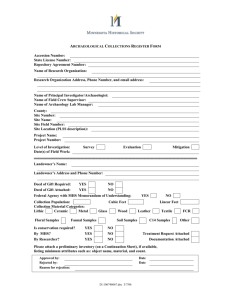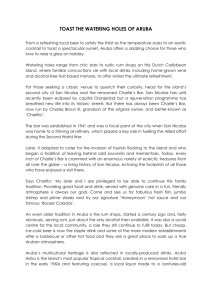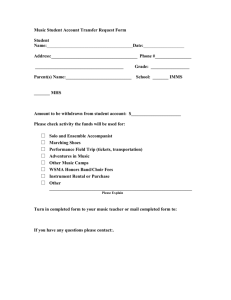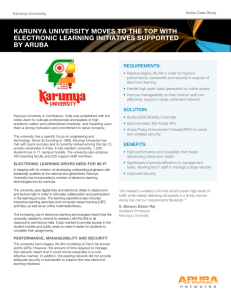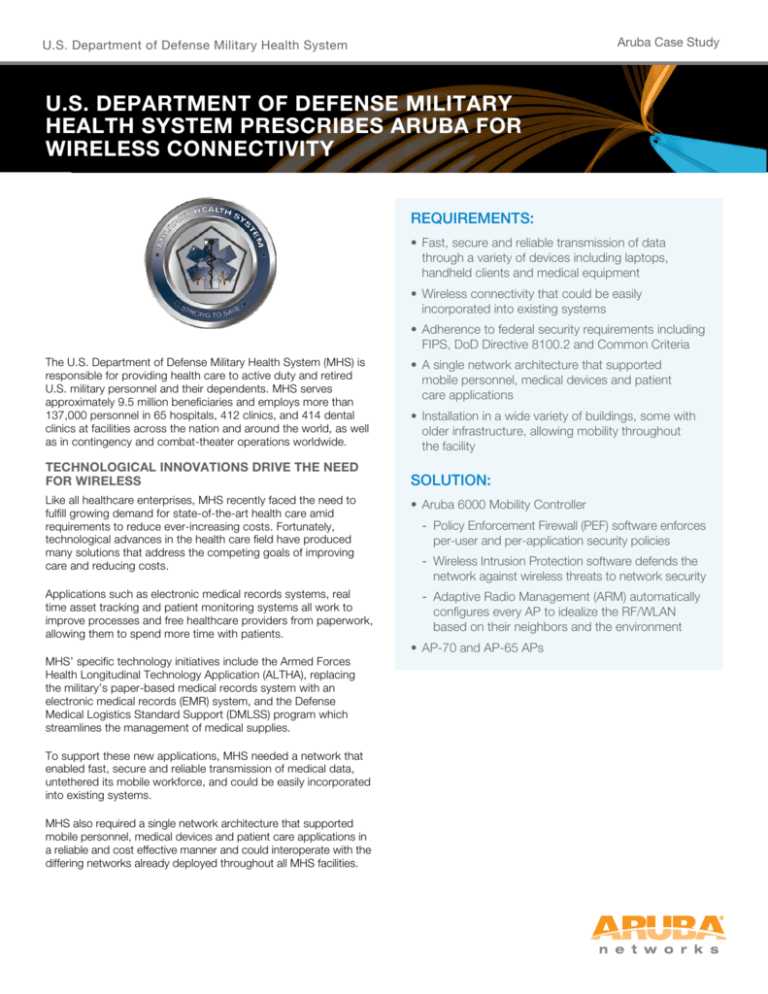
Aruba Case Study
U.S. Department of Defense Military Health System
U.S. Department of Defense Military
Health System prescribes Aruba for
wireless connectivity
Requirements:
• Fast, secure and reliable transmission of data
through a variety of devices including laptops,
handheld clients and medical equipment
• Wireless connectivity that could be easily
incorporated into existing systems
• Adherence to federal security requirements including
FIPS, DoD Directive 8100.2 and Common Criteria
The U.S. Department of Defense Military Health System (MHS) is
responsible for providing health care to active duty and retired
U.S. military personnel and their dependents. MHS serves
approximately 9.5 million beneficiaries and employs more than
137,000 personnel in 65 hospitals, 412 clinics, and 414 dental
clinics at facilities across the nation and around the world, as well
as in contingency and combat-theater operations worldwide.
Technological innovations drive the need
for wireless
Like all healthcare enterprises, MHS recently faced the need to
fulfill growing demand for state-of-the-art health care amid
requirements to reduce ever-increasing costs. Fortunately,
technological advances in the health care field have produced
many solutions that address the competing goals of improving
care and reducing costs.
Applications such as electronic medical records systems, real
time asset tracking and patient monitoring systems all work to
improve processes and free healthcare providers from paperwork,
allowing them to spend more time with patients.
MHS’ specific technology initiatives include the Armed Forces
Health Longitudinal Technology Application (ALTHA), replacing
the military’s paper-based medical records system with an
electronic medical records (EMR) system, and the Defense
Medical Logistics Standard Support (DMLSS) program which
streamlines the management of medical supplies.
To support these new applications, MHS needed a network that
enabled fast, secure and reliable transmission of medical data,
untethered its mobile workforce, and could be easily incorporated
into existing systems.
MHS also required a single network architecture that supported
mobile personnel, medical devices and patient care applications in
a reliable and cost effective manner and could interoperate with the
differing networks already deployed throughout all MHS facilities.
• A single network architecture that supported
mobile personnel, medical devices and patient
care applications
• Installation in a wide variety of buildings, some with
older infrastructure, allowing mobility throughout
the facility
Solution:
• Aruba 6000 Mobility Controller
-- Policy Enforcement Firewall (PEF) software enforces
per-user and per-application security policies
-- Wireless Intrusion Protection software defends the
network against wireless threats to network security
-- Adaptive Radio Management (ARM) automatically
configures every AP to idealize the RF/WLAN
based on their neighbors and the environment
• AP-70 and AP-65 APs
U.S. Department of Defense Military Health System
Additionally, MHS needed a solution that provided secure
transmission of data through a variety of devices including
laptops, handhelds and medical equipment. Since staff and
equipment were always on the move, MHS required a network
that would allow for mobility throughout their installations.
MHS faced some significant challenges. Many healthcare
technology solutions require dedicated and often proprietary
networks for each type of medical system or application, inflating
both capital and operating budgets.
Most commercial wireless network solutions did not meet
stringent government and DoD-specific security requirements
such as FIPS and DoD Directive 8100.2. These early wireless
solutions were often slow and unreliable, suffering from an inability
to effectively propagate RF signals throughout all of the MHS
installations, some of which were 50+ year-old buildings.
Securely protecting sensitive data
To address these needs and challenges, MHS selected Aruba
Networks as one of two approved vendors for their health care
mobility networks, and Aruba’s partnership with MHS has been
phenomenal. As of April 2010, Aruba wireless LANs have been
installed in 47 hospitals and 10 clinics, representing over 80% of
all MHS secure WLAN deployments.
The Aruba solution provides secure FIPS-compliant WLAN
systems that include centrally managed 802.11 a/b/g/n access
points (APs) and Mobility Controllers.
Unlike other solutions, Aruba WLAN systems are completely
self-contained and do not require ancillary security appliances or
cryptology overlays. All functions, such as wireless intrusion
detection, encryption/decryption and firewalling are provided by
the Aruba Mobility Controller.
The result is a significant reduction in costs by eliminating the
need for additional hardware, and less hardware also means
Aruba WLANs are easier to manage because all functions are
within one device.
In addition, having all user data managed for security and
quality-of-service (QoS) functions by one device lowers latency
and increases overall performance. Further, because all security
features are centrally located in the Mobility Controller, the APs
transparently pass the encrypted data between users and the
Controller, and therefore do not pose a security risk as they do
not contain sensitive key material, eliminating the need for secure
enclosures and regular inspections of the APs.
Improving performance and reducing costs
Aruba’s Adaptive Radio Management (ARM) addressed the RF
issues posed by the older MHS facilities by using automatic,
infrastructure- based controls to maximize client performance and
enhance the stability and predictability of the entire WLAN.
Aruba Case Study
benefits:
• The Aruba FIPS certified multi-service controller has
an integrated role-based firewall and wireless
intrusion protection system to safeguard medical and
patient data
• End-to-end security where both user authentication,
traffic validations and encryption extends from the
client – including laptops, handheld devices and
other wireless devices – to the Mobility Controller
• The Aruba solution has the ability to handle real time
applications such as voice and video without
requiring the addition of client proprietary software
• The Aruba solution is easy to install and can also be
deployed as an overlay, plugging APs into any port
on the network
• All management is performed within the centralized
Mobility Controllers, which reduces costs by
eliminating the need for AP security and management
• Aruba’s Adaptive Radio Management (ARM)
automatically maximizes coverage and identifies
interference, eliminating the need for site surveys
and ensuring all mission critical applications get
sufficient resources
U.S. Department of Defense Military Health System
Using ARM, the Aruba system detects challenging RF
environments and accommodates them automatically through
changes to the channel and power settings. This eliminated the
need for expensive site surveys or manual performance tuning
and allowed MHS to get their network up and running more
quickly. ARM gave MHS a high-performing network without all the
costs and management oversight traditionally associated with
wireless networks.
Aruba Case Study
The centralized management function simplifies security and
improves RF management and system performance. Most
importantly, the Aruba solution has allowed MHS to develop and
deploy numerous technological advances that help MHS achieve
its goal of offering state-of-the-art, cost effective patient care
across the nation and around the world.
Facilitating the adoption of new
technologies and applications
Another unique feature of the Aruba solution is the ability to
handle real-time applications such as voice and video. Aruba’s
ARM software, housed in the controller, allows mixed
802.11a/b/g/n client types to interoperate at the highest
performance levels, allocates RF airtime fairly and avoids or
mitigates co-channel interference, all without requiring the
addition of client proprietary software.
ARM allows sharing and optimizing of bandwidth so there is no
need to set up separate classes of service for data, voice or
video. The Aruba controller is the only MHS approved solution
that is able to specifically identify a voice call and optimize the
network accordingly.
The versatile Aruba solution allows MHS staff to speed adoption
of mandated initiatives such as AHLTA and has also sparked new
use cases from various MHS installations.
Some facilities are using Aruba’s system to wirelessly keep track
of medical equipment such as wheelchairs and defibrillators,
enabling staff to view a screen on their client device that indicates
where a piece of equipment is, whether it is in use and how long it
has been idle.
Other sites are investigating using the Aruba network to wirelessly
monitor IV pump monitors and similar equipment. And because
the Aruba solution can easily handle real time applications, one
hospital is using Aruba’s WLAN with the Vocera Nurse Call
System giving caregivers instant access to patient bedside
notifications and respond more quickly to patient needs.
Aruba is the MHS’ overwhelming choice for its healthcare mobility
solutions. The Aruba WLAN system meets or exceeds all DoD
security requirements such as FIPS, Common Criteria and DoD
Directive 8100.2, and is compatible with virtually all existing wire
line and wireless networks within MHS facilities making
deployment quick, easy and cost effective.
www.arubanetworks.com
1344 Crossman Avenue. Sunnyvale, CA 94089
1-866-55-ARUBA | Tel. +1 408.227.4500 | Fax. +1 408.227.4550 | info@arubanetworks.com
© 2013 Aruba Networks, Inc. Aruba Networks’ trademarks include AirWave®, Aruba Networks®, Aruba Wireless Networks®, the registered Aruba the Mobile Edge Company logo, Aruba Mobility
Management System®, Mobile Edge Architecture®, People Move. Networks Must Follow®, RFProtect®, and Green Island®. All rights reserved. All other trademarks are the property of their respective
owners. CS_USDoDMHS_032013




